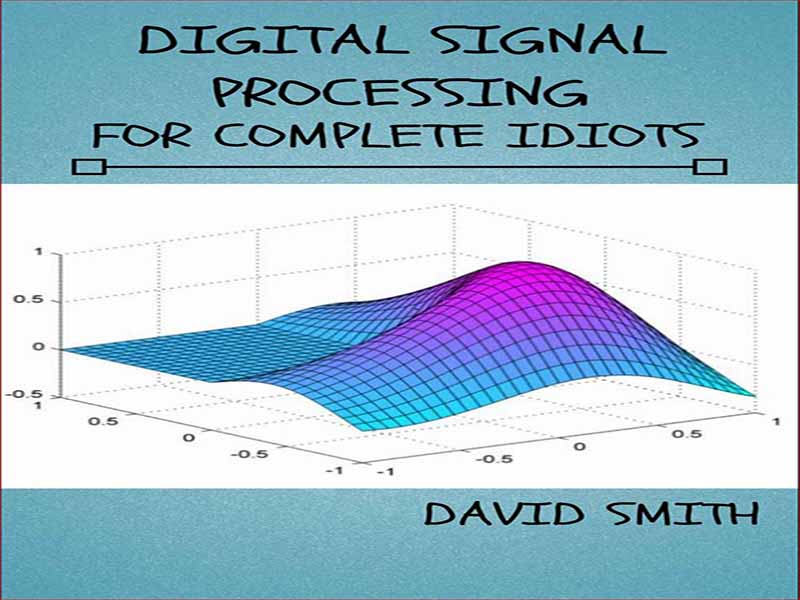- عنوان مجله: digital-signal-processing-For-COMPLETE-IDIOTS
- نویسنده: David-Smith
- حوزه: سیگنال
- سال انتشار: 2022
- تعداد صفحه: 2088
- زبان اصلی: انگلیسی
- نوع فایل: pdf
- حجم فایل: 49.1 مگابایت
پردازش سیگنال دیجیتال (DSP) موضوع مهمی در مهندسی و علوم کاربردی است. سیگنال ها توابع حاوی اطلاعات هستند و DSP به تجزیه و تحلیل و پردازش سیگنال ها (توسط سیستم های اختصاصی) برای استخراج یا اصلاح اطلاعات می پردازد. پردازش سیگنال ضروری است زیرا سیگنال ها معمولاً حاوی اطلاعاتی هستند که به راحتی قابل استفاده یا قابل درک نیستند یا ممکن است توسط منابع ناخواسته مانند نویز مختل شوند. اگرچه بسیاری از سیگنال ها غیر الکتریکی هستند، اما تبدیل آنها به سیگنال های الکتریکی برای پردازش معمول است. بیشتر سیگنالهای طبیعی (مانند سیگنالهای صوتی و زیستپزشکی) عملکردهای پیوسته زمان هستند که به این سیگنالها سیگنالهای آنالوگ گفته میشود. قبل از توسعه DSP، پردازش سیگنال آنالوگ (ASP) و سیستم های آنالوگ تنها ابزارهایی برای مقابله با سیگنال های آنالوگ بودند. اگرچه سیستمهای آنالوگ هنوز به طور گسترده مورد استفاده قرار میگیرند، پردازش سیگنال دیجیتال (DSP) و سیستمهای دیجیتال توجه بیشتری را به خود جلب میکنند که تا حد زیادی به دلیل مزایای قابل توجه سیستمهای دیجیتال نسبت به همتایان آنالوگ خود است. این مزایا عبارتند از برتری در عملکرد، سرعت، قابلیت اطمینان، کارایی ذخیره سازی، اندازه و هزینه. علاوه بر این، DSP میتواند مشکلاتی را که با استفاده از ASP حل نمیشوند، حل کند، مانند تجزیه و تحلیل طیفی سیگنالهای چند جزیی، فیلتر تطبیقی و عملیات در فرکانسهای بسیار پایین. به دنبال پیشرفت های اخیر در مهندسی که در دهه های 1980 و 1990 رخ داد، DSP به یکی از سریع ترین صنایع در حال رشد جهان تبدیل شد. از آن زمان DSP نه تنها بر حوزههای سنتی مهندسی برق تأثیر گذاشته است، بلکه تأثیرات گستردهای بر سایر حوزههایی داشته است که با اطلاعاتی مانند اقتصاد، هواشناسی، زلزلهشناسی، مهندسی زیستی، اقیانوسشناسی، ارتباطات، نجوم، مهندسی رادار، مهندسی کنترل و… برنامه های مختلف دیگر
Digital Signal Processing (DSP) is a subject of central importance in engineering and the applied sciences. Signals are information-bearing functions, and DSP deals with the analysis and processing of signals (by dedicated systems) to extract or modify information. Signal processing is necessary because signals normally contain information that is not readily usable or understandable, or which might be disturbed by unwanted sources such as noise. Although many signals are nonelectrical, it is common to convert them into electrical signals for processing. Most natural signals (such as acoustic and biomedical signals) are continuous functions of time, with these signals being referred to as analog signals. Prior to the development of DSP, Analog Signal Processing (ASP) and analog systems were the only tools to deal with analog signals. Although analog systems are still widely used, Digital Signal Processing (DSP) and digital systems are attracting more attention, due in large part to the significant advantages of digital systems over their analog counterparts. These advantages include superiority in performance, speed, reliability, efficiency of storage, size and cost. In addition, DSP can solve problems that cannot be solved using ASP, like the spectral analysis of multi-component signals, adaptive filtering, and operations at very low frequencies. Following the recent developments in engineering which occurred in the 1980s and 1990s, DSP became one of the world’s fastest growing industries. Since that time DSP has not only impacted on traditional areas of electrical engineering, but has had far reaching effects on other domains that deal with information such as economics, meteorology, seismology, bioengineering, oceanology, communications, astronomy, radar engineering, control engineering and various other applications.
این کتاب را میتوانید از لینک زیر بصورت رایگان دانلود کنید:



































نظرات کاربران